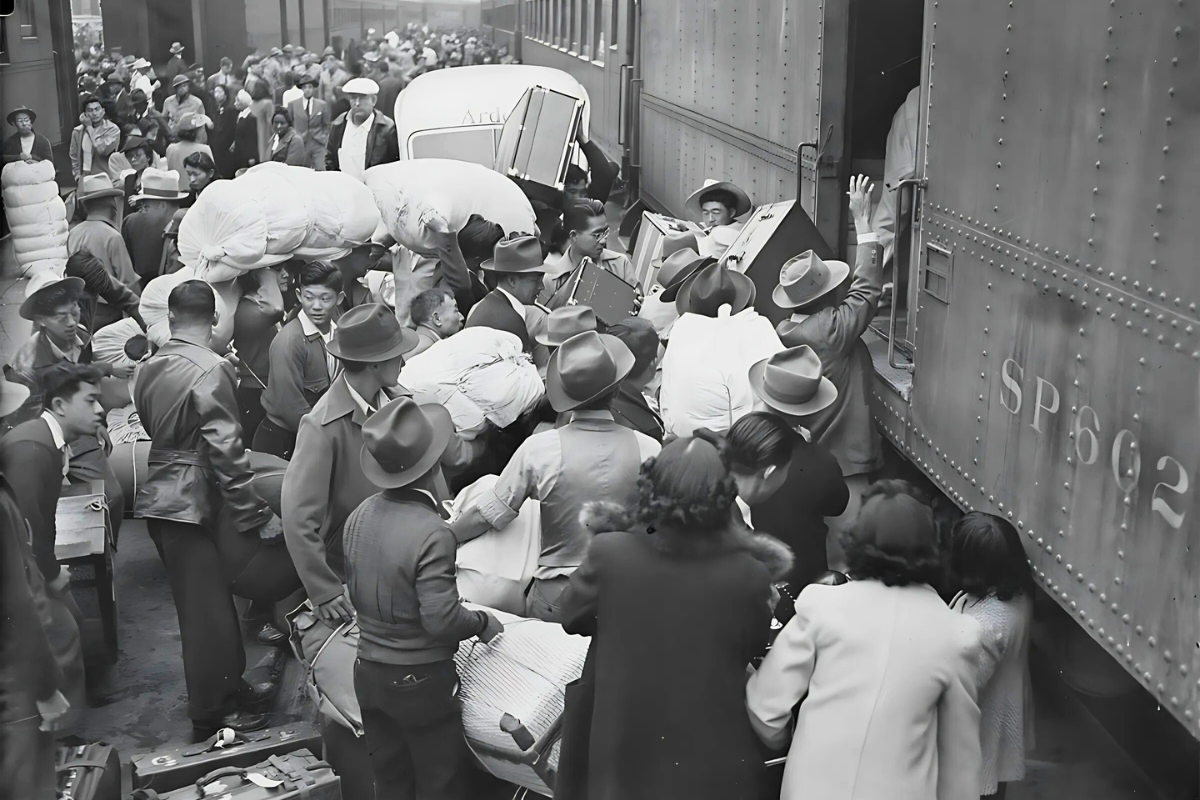Seventy years after the U.S. government forcibly interred more than 120,000 people of Japanese descent, a majority of Americans now say the period marks a shameful and unjust chapter in American history.
Those are the findings of a recent YouGov poll published in April which also found contrasting opinions on how Americans feel about reparations for different communities.
The poll is the first of its kind to gauge American attitudes on Japanese internment since 1942. “That was the genesis of the survey,” says veteran pollster Kathy Frankovic, who led the survey.
Between 1942 and 1946, the U.S. government forcibly relocated and incarcerated more than 120,000 people of Japanese descent in 10 internment camps spread across the country’s interior. Some two thirds of those incarcerated were American citizens.
A poll conducted in 1942 found 93% of Americans supported the internment of non-citizen Japanese, while a smaller majority (59%) supported the internment of citizen and non-citizen alike. The poll was conducted during the height of fighting in WWII and just one year after the bombing of Pearl Harbor by Japanese forces.
By contrast, Frankovic’s online survey of 1,116 U.S. adult citizens, conducted between January and February of this year, found 66% of respondents described Japanese internment as unjust or shameful, with Democrats more likely to describe the action as “shameful” (57%) than Republicans (22%). Thirty one percent of Republicans called it “unjust but understandable wartime action.”
The sample was weighted according to gender, age, race, education, 2024 presidential vote, 2020 election turnout and presidential vote, baseline party identification, and current voter registration status.
Migrant detentions
The findings come as the U.S. now finds itself once again locked in debate over the high-profile detention of legal permanent residents by the Trump Administration, which has invoked an 18th Century law to justify the arrest and in some cases deportation of green card holders and others in the country in violation of their due process rights.
President Trump has also floated the idea of deporting U.S. citizens without trial.
A New York Times/Sienna poll released in April found support for the government’s policies slipping, though largely on economic grounds. A majority (51%) approve of President Trump’s approach to immigration, though 54% agreed he has overreached and “exceeded” the powers available to him under the Constitution.
Partisan attitudes in Frankovic’s poll mirror those found in both the 1942 poll and the recent NYT/Sienna poll, with Republicans more likely overall to support tougher policies when it comes to the treatment of minority populations.
Frankovic’s survey also polled respondents on attitudes towards American wartime policy barring the entry of Jews from Eastern Europe. A majority (58%) said it was the wrong thing to do. Most respondents (63%) also supported America’s decision to enter WWII, though only half (50%) agreed with the implementation of the country’s first peacetime draft in 1940.
On the use of atomic bombs, which killed an estimated 150,000 to 246,000 people in the Japanese cities of Hiroshima and Nagasaki, 40% say it was the right thing to do while 29% say it wasn’t.
Divides over reparations
The survey “opened up the door to look at a lot of things that had to do with World War II,” explains Frankovic, citing the issue of reparations, which she says, “has not had a very, very large number of questions asked about it.”
In 1988, then-President Ronald Reagan formally apologized for the actions taken against Japanese Americans during the war and granted reparations of $20,000 per incarcerated person. Today, a majority of Americans across the political spectrum approve of the reparations paid to the descendants of interred Japanese Americans by 64% to 20%. Respondents were even twice as likely to say that $20,000 was too small an amount.
Conversely, a majority disapprove of reparations for African Americans and descendants of slavery; 38% support it, 43% oppose it, and 19% are not sure. Along partisan lines, sixty five percent of Democrats support reparations while 63% of Republicans oppose it. The issue was also more popular among younger people.
Reparations for Native Americans saw much higher approval; 56% of respondents agreed, including 75% of Democrats and 41% of Republicans.
Frankovic says she was most surprised by the question about reparations. While the party-line divisions were typical, the point of intrigue lay in the different opinions on which groups should receive redress.
“Reparations come with your feelings about a group. Your feelings about what happened to a group in the past and,” she says, “your feelings about spending government money, which Democrats are usually more supportive of than Republicans on a whole host of things.”
The poll also included a question on the U.S. response to the 9/11 attacks, and whether the government “should have put Arabs and Arab Americans under special surveillance, or if it would have been a mistake to target a nationality group as was done with Japanese Americans after Pearl Harbor.”
Thirty four percent said they should have increased surveillance, 40% called it a mistake, and 26% didn’t know.




